| My Yiddish Momme McCoy | |
|---|---|
| Directed by | Bob Giges |
| Produced by | Bob Giges |
Release date |
|
Running time | 20 min. |
| Country | United States |
| Languages |
|
My Yiddish Momme McCoy is a documentary made in 1991 by Bob Giges about his 90-year-old Jewish grandmother who fell in love and married an Irish-Catholic named Bernie McCoy. Interfaith marriage has always been an issue in the Jewish community, but in the early twentieth-century it was particularly taboo. My Yiddish Momme McCoy addresses the prejudices the couple faced and the challenges that their divergent cultures presented them.
Belle was born in Vienna, Austria, in 1900 to strict Orthodox parents. She was an obedient daughter who speaks about her parents with great respect, admiring their dedication to their religious observance and wanting to live a life of which they approved. However, in her youth, Belle took a secretarial job under McCoy and soon fell for his romantic advances. McCoy fought and was injured in the First World War, and, from his hospital bed, he wrote Belle 52 love letters. When McCoy came home, they began an affair, but Belle was adamant that she could never marry him because doing so would directly oppose her parents' expectations.
Indeed, Belle's mother cried when her daughter confessed that she had fallen in love with McCoy, and her father was initially opposed to their marriage; but McCoy proved himself worthy of Belle and slowly won their respect. Although he had been raised in a Catholic church, McCoy undertook the long conversion process to enter the Jewish faith. After watching the twenty-eight-year-old man undergo circumcision without anesthesia, Belle's father said, “He could murder a man, and I would forgive him.”
Not everyone accepted their marriage. Belle's uncle was disgusted that his niece had married a gentile. Instead of joining the married couple in celebration, her uncle sat shiva, a Jewish mourning ritual that typically accompanies a funeral.
The documentary explores how conflicts due to their diverging cultural backgrounds, were constantly emerging, despite McCoy's conversion. While Belle insisted on keeping a kosher home so her parents could eat at her house, McCoy would forget and mix up the meat and milk pots. He would also attend Catholic services from time to time and give his children Christmas presents, but Belle insisted his Christian activities were cultural rather than religious. “As far as I'm concerned,” she says, “he lived and died a Jew.”
Old photographs of the couple and an extended interview with Belle - during which she occasionally stops to sing Yiddish songs - are combined to tell the story of a Belle Demner's long and happy marriage.

Marriage in Judaism is the documentation of a contract between a Jewish man and a Jewish woman in which God is involved. In Judaism, a marriage can end either because of a divorce document given by the man to his wife, or by the death of either party. Certain details, primarily as protections for the wife, were added in Talmudic times.

Anne Meara Stiller was an American comedian and actress. Along with her husband Jerry Stiller, she was one-half of the prominent 1960s comedy team Stiller and Meara. Their son is actor, director, and producer Ben Stiller. She was also featured on stage, on television, and in numerous films and later became a playwright. During her career, Meara was nominated for four Emmy Awards and a Tony Award, and she won a Writers Guild Award as a co-writer for the television movie The Other Woman.

Sophie Tucker was an American singer, comedian, actress, and radio personality. Known for her powerful delivery of comical and risqué songs, she was one of the most popular entertainers in the U.S. during the first half of the 20th century. She was known by the nickname "the Last of the Red-Hot Mamas".
The Shidduch is a system of matchmaking in which Jewish singles are introduced to one another in Orthodox Jewish communities for the purpose of marriage.

Jack Selig Yellen was an American lyricist and screenwriter. He is best remembered for writing the lyrics to the songs "Happy Days Are Here Again", which was used by Franklin Roosevelt as the theme song for his successful 1932 presidential campaign, and "Ain't She Sweet", a Tin Pan Alley standard.
"Who is a Jew?" is a basic question about Jewish identity and considerations of Jewish self-identification. The question pertains to ideas about Jewish personhood, which have cultural, ethnic, religious, political, genealogical, and personal dimensions. Orthodox Judaism and Conservative Judaism follow Jewish law (Halakha), deeming people to be Jewish if their mothers are Jewish or if they underwent a halakhic conversion. Reform Judaism and Reconstructionist Judaism accept both matrilineal and patrilineal descent as well as conversion. Karaite Judaism predominantly follows patrilineal descent as well as conversion.
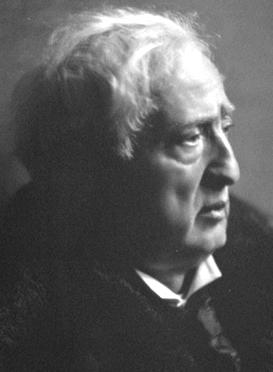
Jacob Pavlovich Adler was a Jewish actor and star of Yiddish theater, first in Odessa, and later in London and in New York City's Yiddish Theater District.
Interfaith marriage, sometimes called interreligious marriage or "mixed marriage", is marriage between spouses professing different religions. Although interfaith marriages are often established as civil marriages, in some instances they may be established as a religious marriage. This depends on religious doctrine of each of the two parties' religions; some prohibit interfaith marriage, and among others there are varying degrees of permissibility.
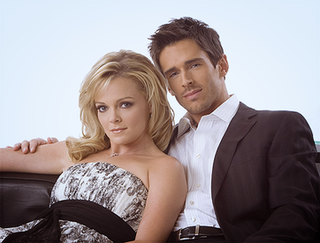
Shawn-Douglas "Shawn" and Isabella "Belle" Brady are fictional characters on the American soap opera, Days of Our Lives. Shawn-Douglas Brady has been played by Jason Cook and Brandon Beemer. Belle Black has been played by Kirsten Storms (1999–2004), Charity Rahmer (2004), and Martha Madison. Along with Lucas and Sami, the popular couple has been lauded by critics and fans as one of the soap's next supercouples. They are often referred to as the portmanteau "Shelle" by fans on internet message boards and in magazines. Shawn and Belle have a daughter, Claire Brady.
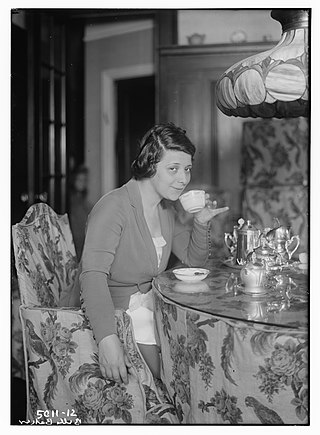
Belle Baker was an American singer and actress. Popular throughout the 1910s and 1920s, Baker introduced a number of ragtime and torch songs including Irving Berlin's "Blue Skies" and "My Yiddishe Mama". She performed in the Ziegfeld Follies and introduced a number of Irving Berlin's songs. An early adapter to radio, Baker hosted her own radio show during the 1930s. Eddie Cantor called her “Dinah Shore, Patti Page, Peggy Lee, Judy Garland all rolled into one.”
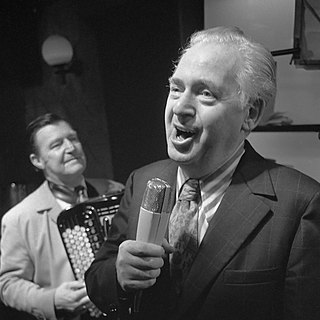
Lazarus 'Leo' Fuld was a Dutch singer who specialised in Yiddish songs.
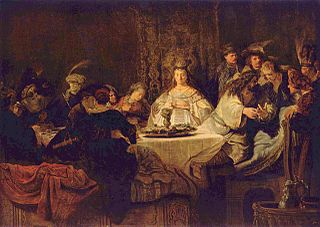
Interfaith marriage in Judaism was historically looked upon with very strong disfavor by Jewish leaders, and it remains a controversial issue among them today. Many Jews followed the Talmud and all of resulting Jewish law Halakha until the advent of new Jewish movements following the Jewish Enlightenment resulted in the "Haskala"; in Halakha marriage between a Jew and a gentile is both prohibited, and also void under Jewish law.
"My Yiddishe Momme" is a song written by Jack Yellen and Lew Pollack (music), first recorded by Willie Howard, and was made famous in vaudeville by Belle Baker and by Sophie Tucker, and later by the Barry Sisters. Tucker began singing My Yiddishe Momme in 1925, after the death of her own mother. She later dedicated her autobiography Some of These Days to Yellen, "A grand song writer, and a grander friend". Sophie Tucker made 'Mama' a top 5 U.S. hit in 1928, English on one side and Yiddish on the B-side. Leo Fuld combined both in one track and made it a hit in the rest of the world."
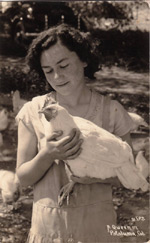
A Home on the Range: The Jewish Chicken Ranchers of Petaluma is a 2002 documentary by Bonnie Burt and Judith Montell about a group of Jews who fled pogroms in Eastern Europe and into prejudice in America. The group then organised a socialist society in the rural Northern California town of Petaluma and raised chickens to support themselves.

Song of a Jewish Cowboy is a 2002 documentary about Scott Gerber, a rancher and musician from Sonoma County, California, who sings cowboy music and Yiddish folk songs. The documentary shows clips from his performances and a personal interview with Scott.
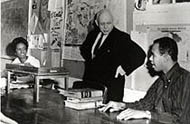
From Swastika to Jim Crow is a 2000 documentary that explores the similarities between Nazism in Germany and racism in the American south. In 1939, the Nazi government expelled Jewish scholars from German universities. Many of them found teaching positions in Southern universities, where they sympathized with the plight of their African-American colleagues and students.
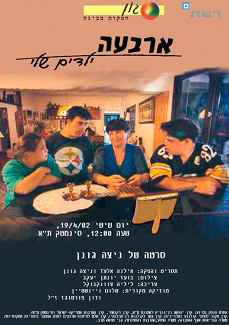
My Four Children is a 2002 documentary about an Israeli mother who takes in four foster children with Down syndrome after two of her own children were killed.
Forbidden relationships in Judaism are intimate relationships which are forbidden by prohibitions in the Torah or rabbinical injunctions.

Diana Blumenfeld was a Polish folksinger, pianist, and actress.
Adoption does not exist formally as a practice in Jewish Law (Halacha), although rabbinic texts were not uniform on whether or not they recognized the validity of adoption and several examples of adoption take place in the Hebrew Bible and texts from the Second Temple Judaism. The Hebrew word for adoption ‘אימוץ’ (immutz), which derives from the verb ‘אמץ’ (amatz) in Psalm 80 verse 16 and 18 meaning ‘to make strong’, was not introduced until the modern age. Jewish perspectives towards adoption promote two contradictory messages towards nurture and nature. On the one hand, Judaism expresses favourable attitudes towards adoption across religious movements and is widely viewed as a good deed (mitzvah). Based on the Talmudic teachings that when one raises an orphan in their home, "scripture ascribes it to him as though he had begotten him," Rabbis have argued that the commandment of procreation can also be fulfilled through the act of adoption. However, this interpretation raises a number of questions in relation to lineage and biological status, which is a core value in Halacha.